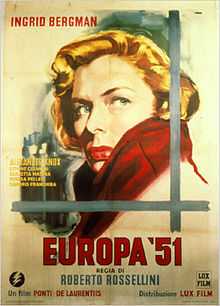Europe '51
| Europe '51 | |
|---|---|
 | |
| Directed by | Roberto Rossellini |
| Produced by |
Roberto Rossellini Carlo Ponti Dino De Laurentiis |
| Written by |
Roberto Rossellini Sandro De Feo Mario Pannunzio Ivo Perilli Brunello Rondi |
| Starring |
Ingrid Bergman Alexander Knox |
| Music by | Renzo Rossellini |
| Cinematography | Aldo Tonti |
| Editing by | Jolanda Benvenuti |
| Distributed by | I.F.E. Releasing Corporation |
| Release dates |
4 December 1952 (Italy) 1953 (Germany) November 3, 1954 (U.S.) |
| Running time | 113 minutes |
| Country | Italy |
| Language | Italian |
Europe '51 (Italian: Europa '51, Italian pronunciation: [euˈrɔpa tʃinkwanˈtuno], also known as The Greatest Love) is a 1952 Italian neorealist film directed by Roberto Rossellini, starring Ingrid Bergman and Alexander Knox.
Background
Long fascinated by Francis of Assisi, Roberto Rossellini decided to create a film that placed a person of the saint's character in post-war Italy and showed what the consequences would be.[1]
Synopsis
Irene (Bergman) and George Girard (Knox) are a wealthy couple living in post-war Rome with their son Michele (Sandro Franchina). During a dinner party, Michele constantly tries to get his mother's attention, but Irene is more interested in being a good hostess to her guests than an attentive mother. As a result, Michele attempts suicide by falling several stories through a stairwell, fracturing his hip.
At the hospital, Irene promises to never leave Michele and to be more attentive, but he dies soon after from a blood clot. In some versions he returns home and during a party his parents are hosting, he commits suicide by leaping from a window. Irene is bedridden for 10 days, before enlisting the help of Andrea Casatti (Ettore Giannini) to help her overcome her grief. Being a Communist, he takes her to the poorer parts of Rome and leads her into donating her time and money to help people there. While there, she gives the money for a boy's medical treatment, helps a woman with six children to find a job at a factory (where she has a life-changing experience working for a day in order to fill in for the woman), and cares for a woman who is dying of tuberculosis.
As a result of helping these people, she spends less and less time at home. Her husband comes to the conclusion that she is having an affair with Andrea, which causes her to leave him. In addition, she is picked up by the police after helping a boy who had committed a theft evade arrest (she had told him to turn himself in).
While she is in custody, her husband and the authorities decide to put her in a mental institution. At the end of the film, she is up for review on whether she will stay there permanently. It is decided that her philosophy of helping people is dangerous for the fragile post-war society. Therefore, she becomes a permanent member of the institution.
Cast
- Ingrid Bergman — Irene Girard (dubbed in Italian by Lydia Simoneschi)
- Alexander Knox — George Girard
- Ettore Giannini — Andrea Casatti
- Giulietta Masina — Passerotto
- Marcella Rovena — Mrs. Puglisi
- Tina Perna — Cesira
- Sandro Franchina — Michele Girard
Awards
Ingrid Bergman won the 1953 Silver Ribbon award from the Italian National Syndicate of Film Journalists for her performance. In addition, Roberto Rossellini won the International Award and was nominated for the Golden Lion award at the 1952 Venice Film Festival.
Notes
- ↑ "Roberto Rossellini: A Retrospective - Series Details - Europa '51". UCLA Film and Television Archive. Retrieved 2007-03-13.
External links
- Europe '51 at the Internet Movie Database
- Europe '51 at allmovie
- Europe '51 at the TCM Movie Database
| |||||